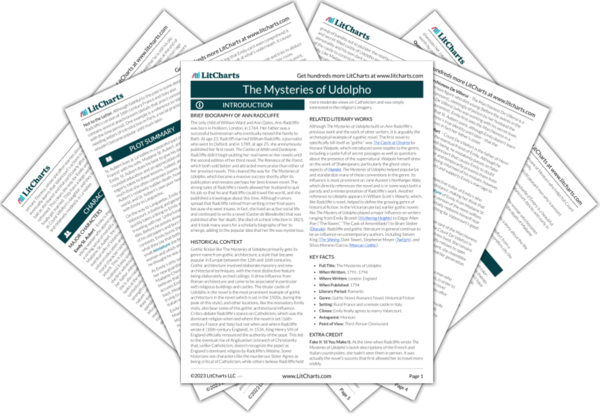From an early age, St. Aubert places an emphasis on giving Emily a good education. His instruction is well-rounded, as he teaches Emily about science, literature, nature, music, and drawing. He provides her with several musical instruments and encourages her to express her creativity through poems. As St. Aubert notes at one point, his philosophy is that an educated mind protects a person not only from ignorance but also from vice. Emily’s prudent decision-making when she grows up demonstrates the value of St. Aubert’s philosophy. By contrast, a man like Montoni shows no interest in art or science, even though his castle of Udolpho is in a beautiful natural area and full of art. His lack of appreciation for these beautiful things leads him to focus solely on money-making schemes, and he’s unable to find gratification in healthier pursuits, which ultimately leads to his arrest and death. The Mysteries of Udolpho dramatizes the benefits of knowledge and art by showing how a well-rounded education can lead a person to make prudent decisions while insulating them from the temptation to seek gratification in life from material things, which the novel suggests will never be satisfying.
The Value of Education and Art ThemeTracker

The Value of Education and Art Quotes in The Mysteries of Udolpho
On searching for the book, she could find it nowhere, but in its stead perceived a volume of Petrarch’s poems, that had belonged to Valancourt, whose name was written in it, and from which he had frequently read passages to her, with all the pathetic expression, that characterised the feelings of the author. She hesitated in believing, what would have been sufficiently apparent to almost any other person, that he had purposely left this book, instead of the one she had lost, and that love had prompted the exchange; but, having opened it with impatient pleasure, and observed the lines of his pencil drawn along the various passages he had read aloud, and under others more descriptive of delicate tenderness than he had dared to trust his voice with, the conviction came, at length, to her mind.
Madame Cheron’s avarice at length yielded to her vanity. Some very splendid entertainments, which Madame Clairval had given, and the general adulation, which was paid her, made the former more anxious than before to secure an alliance, that would so much exalt her in her own opinion and in that of the world.
Emily paused to weep at this recollection. “Perhaps,” resumed she, “perhaps, those strains I heard were sent to comfort,—to encourage me! Never shall I forget those I heard, at this hour, in Languedoc! Perhaps, my father watches over me, at this moment!” She wept again in tenderness.
And, if the weak hand, that has recorded this tale, has, by its scenes, beguiled the mourner of one hour of sorrow, or, by its moral, taught him to sustain it—the effort, however humble, has not been vain, nor is the writer unrewarded.











